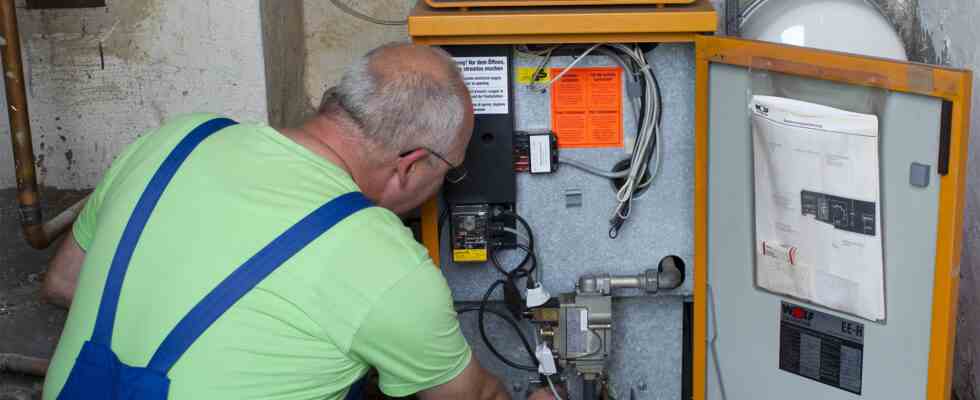Status: 03/29/2022 08:06 a.m
The traffic light government wants to make faster progress in climate protection in buildings. A new program to replace old oil and gas heating systems is planned. But how quickly can this succeed?
Climate protection in buildings: That can take time. Veit Bürger from the Öko-Institut has been researching this for a long time. He knows that anyone who renovates the roof today “will not do anything to the roof for the next 40 years. The same applies to the outer wall.” Windows and boilers also often lived for 25 or 30 years. “That’s why it takes so long, even if you take new policy measures today, before you see a noticeable effect.”
More surface, more heating
15 percent of German CO2 emissions are currently caused by heating buildings. Emissions are falling, but only very slowly. Heating systems are becoming more efficient and there are more heat pumps that run on green electricity, but the trend in Germany is towards more and more living space per person. And more space means: more heating. In addition, when it comes to phasing out coal, for example, it is ultimately a question of the decisions of a few large power plant operators.
Who installs the heat pumps?
When it comes to climate protection in the building sector, things are more complex. Ultimately, millions of home builders and owners decide individually. And they are not just about whether the new heating or the new windows will pay off in the long term. Climate protection expert Bürger speaks of “non-financial obstacles”. “Renovation measures make noise, dirt, they last. You have to take care, find someone who does it at all. Keyword: shortage of skilled workers.” For example, there are too few technicians who are familiar with heat pumps.
The new government wants to speed up climate protection in buildings. In doing so, it is trying not only to use the carrot – i.e. funding – but also the stick: for example, with tougher efficiency requirements for new buildings. The EH-55 standard should be standard by next year. “Whoever builds cheaply builds twice,” explained Federal Building Minister Klara Geywitz from the SPD last week in the Bundestag. “Anyone who builds today so that people have low rents cannot build in such a way that they will have high additional costs in the future.” You need both together: social housing that is climate-friendly.
Criticism of new construction funding
A contentious issue has long been government funding for new construction. Economics Minister Robert Habeck from the Green Party temporarily stopped funding for new efficient houses in January due to excessive demand. In the coming months he wants to make a reform proposal. Veit Bürger from the Öko-Institut generally believes that funding for new buildings is a waste of money. “Building owners take subsidies with them, even though they would have built it anyway,” he says.
Existing buildings are the much bigger climate problem anyway, “particularly the buildings that were built after World War II, between 1945 and 1970,” says Bürger. As a rule, it was built cheaply and quickly. The result: a poor energy balance. You have to get to these buildings as soon as possible. “Worst first” is the principle, the worst first. In the case of renovations, it will not work without subsidies, says Bürger. Otherwise too many costs could get stuck with tenants and landlords. Or owners don’t have enough incentive to do anything at all.
New heater replacement program planned
In addition to better insulation, new roofs and windows, climate protection in buildings is primarily about the type of heating. After the coalition summit last week, the government announced that at least two-thirds of newly installed heating systems should be operated with renewable energies from 2024 – a year earlier than previously planned. Heat pumps, wood pellet heaters and solar collectors will gain even more momentum. In addition, the government also wants to launch a new exchange program for old oil and gas heating systems. Green leader Ricarda Lang is already talking about “farewell to fossil gas heating”.
Even if old gas and oil boilers do not disappear overnight and the shortage of skilled workers remains a bottleneck, the Bürger expert from the Öko-Institut recognizes at least the willingness of the traffic light government not to remain just small when it comes to climate protection in buildings. It will be “exciting,” says Bürger, “when the first concepts and draft laws are on the table. Whether it will be possible to push them through against greater resistance from the housing industry and associations.” But the trend towards more climate-friendly heating systems could also accelerate completely independently of political action. Because of the war in Ukraine and the high prices for oil and gas.
Climate protection in buildings: the government wants to speed things up
Marcel Heberlein, ARD Berlin, March 28, 2022 at 8:23 a.m

